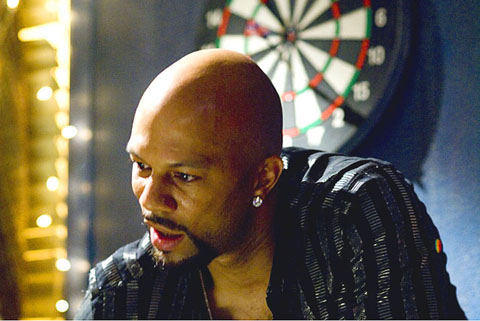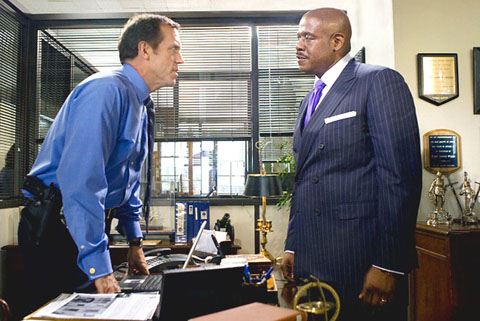The alarm clock buzzes. Keanu Reeves wakes up fully dressed in a striped shirt, raises his gun and rolls out of bed. He puts his piece on the bathroom sink, next to his toothbrush, and takes a good long look at himself in the mirror. Then he pukes in the toilet. He climbs into the car and heads down the freeway as a glowing orange orb shimmers behind the skyscrapers of Los Angeles. Only the sun isn’t rising. It’s setting.
Night: Koreatown. Tom Ludlow (Reeves) stops by a liquor store and gulps down a couple of teeny airline bottles of vodka. He insults some Korean hoods, who want to buy a machine gun he’s got stashed in his trunk, insinuating that they’re Japanese. “You dress white, talk black and drive Jew,” he tells them before throwing in an all-purpose anti-Asian slur.
Ludlow is a racist cop, a renegade cop, a vigilante cop. We know this because next he wantonly massacres a bunch of Korean bad guys and makes it look like they shot one another. Then, when he’s confronted by his African-American ex-partner, Terrence Washington (Terry Crews), he yells, “I’m racist!” In response, Washington calls him a “white boy.” This seems especially odd because the Chinese-Hawaiian-Caucasian Reeves is, ancestrally speaking, roughly as white as Barack Obama.

This is the setup for Street Kings, which immediately forgets it ever brought up all that racial stuff anyway. Almost as quickly, it loses interest in its main character’s alcoholism. Then it raises the idea that Ludlow may still be in pain over his wife’s death, but instantly ignores that, too, turning its deficit of attention to the killing of a police officer. The murder investigation leads the bull-headed Ludlow — who, mind you, does not play by the rules! — along a twisted trail of corruption that leads all the way to the highest levels of the LAPD. Yeah, I know. Who could have anticipated that?
If you wanted to make a strictly generic parody of crime writer James Ellroy’s hard-boiled Southland fiction (L.A. Confidential, The Black Dahlia, White Jazz), could you do worse than to hire Ellroy himself and then, maybe, re-write him a few times? Maybe not, because that’s what appears to have happened here. Ellroy is credited with the template-stamped story and is listed first in the screenplay credits, followed by Kurt Wimmer and Jamie Moss, each of their names separated by an “and” instead of an ampersand, which tells you that they did not work together. Director David Ayer (writer of Training Day and cowriter of The Fast and the Furious) has also been fingered as a scripting suspect, but he is not identified by name in the final line-up. If you’ve seen the trailer, know that about half of what’s in it isn’t in the final movie. That’s a hint.
Street Kings is an anemic attempt to evoke the big, shiny action pictures of the late 1980s and early 1990s, the heyday of Bruce Willis and Arnold Schwarzenegger, when Timothy Dalton was 007 and Clint Eastwood had fewer wrinkles and bigger hair. Back when, if an aquarium appeared in a scene, somebody was damn sure going to shoot it before the movie was over. The films, good and bad, were loud and slick and mostly set in LA, directed by people like John McTiernan, Richard Donner, Tony Scott and Renny Harlin: the Die Hards, the Lethal Weapons, The Rookie, The Last Boy Scout, The Last Action Hero.

PHOTOS COURTESY OF FOX
Reeves got in on that wave, too, with Point Break and Speed, dodging bullets and breaking regulations in the name of the law. Those were the days when overkill was never enough, and Street Kings at least gets that part right. The crooked cops are not only crooked, they’re also murderers willing to drop everything to rape their victims’ widows and girlfriends just for fun. They are bad, bad, bad.
So is the screenplay, which reads like a Bartlett’s of general-purpose action-movie lines:
“You were toe-to-toe with evil and you won.”
“Why can’t you have a normal life like everybody else?”
“Everything I touch dies.”
“Who are you to judge me?”
That doesn’t even scratch the surface of the movie’s banality, but every once in a while there’s a real doozy like: “He’s got a PhD in catching cops slipping up!” Or a text message from one crooked cop to another: “He’s here. Kill him.” And then the dude signs his nickname.
But come on, don’t give Keanu Reeves — or anybody, for that matter — a line like this, about Tom’s ex-partner: “We were black and white in black and white, back when it meant something.” Are these people trying to make the Showgirls of retro-1990s cop movies?
Sophomore director Ayer (Harsh Times) is maybe not so sure. He seems invested in the chases and shoot-outs, but sometimes his spatial relationships break down, and you can’t tell who is where. In one gunfight an entire Harvest Gold-colored refrigerator materializes out of nowhere. Meanwhile, Academy-Award winner Forest Whitaker doesn’t seem to know what movie this should be, while House star Hugh Laurie — giving exactly the same performance he does on TV — may be in on the joke, even if nobody else is.

In the March 9 edition of the Taipei Times a piece by Ninon Godefroy ran with the headine “The quiet, gentle rhythm of Taiwan.” It started with the line “Taiwan is a small, humble place. There is no Eiffel Tower, no pyramids — no singular attraction that draws the world’s attention.” I laughed out loud at that. This was out of no disrespect for the author or the piece, which made some interesting analogies and good points about how both Din Tai Fung’s and Taiwan Semiconductor Manufacturing Co’s (TSMC, 台積電) meticulous attention to detail and quality are not quite up to

April 21 to April 27 Hsieh Er’s (謝娥) political fortunes were rising fast after she got out of jail and joined the Chinese Nationalist Party (KMT) in December 1945. Not only did she hold key positions in various committees, she was elected the only woman on the Taipei City Council and headed to Nanjing in 1946 as the sole Taiwanese female representative to the National Constituent Assembly. With the support of first lady Soong May-ling (宋美齡), she started the Taipei Women’s Association and Taiwan Provincial Women’s Association, where she

It is one of the more remarkable facts of Taiwan history that it was never occupied or claimed by any of the numerous kingdoms of southern China — Han or otherwise — that lay just across the water from it. None of their brilliant ministers ever discovered that Taiwan was a “core interest” of the state whose annexation was “inevitable.” As Paul Kua notes in an excellent monograph laying out how the Portuguese gave Taiwan the name “Formosa,” the first Europeans to express an interest in occupying Taiwan were the Spanish. Tonio Andrade in his seminal work, How Taiwan Became Chinese,

Mongolian influencer Anudari Daarya looks effortlessly glamorous and carefree in her social media posts — but the classically trained pianist’s road to acceptance as a transgender artist has been anything but easy. She is one of a growing number of Mongolian LGBTQ youth challenging stereotypes and fighting for acceptance through media representation in the socially conservative country. LGBTQ Mongolians often hide their identities from their employers and colleagues for fear of discrimination, with a survey by the non-profit LGBT Centre Mongolia showing that only 20 percent of people felt comfortable coming out at work. Daarya, 25, said she has faced discrimination since she